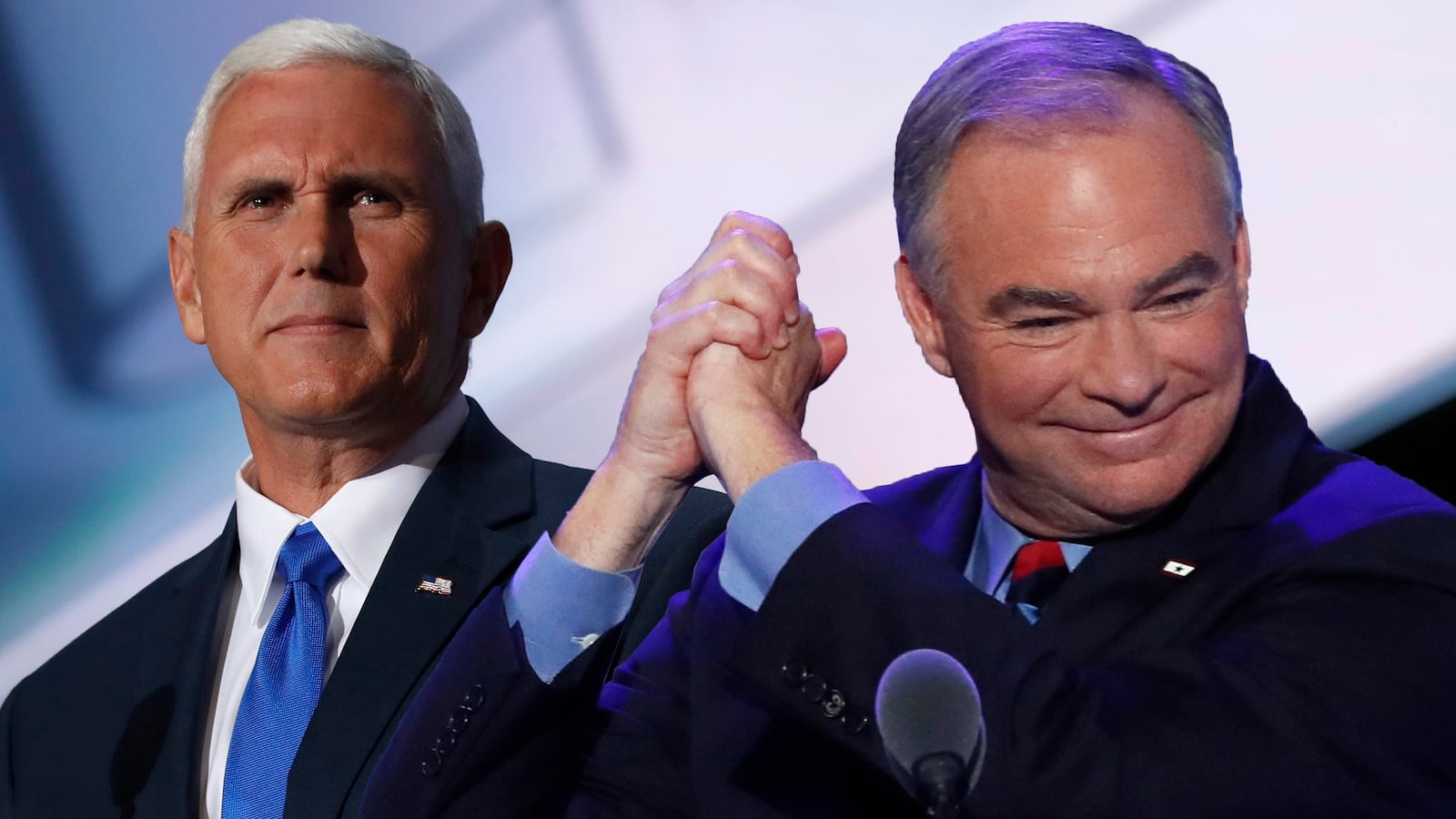In Farmville, Virginia, two guys you might have heard of—Donald Trump’s veep contender, Mike Pence; and Hillary Clinton’s, Tim Kaine—will square off Tuesday night to see who can gut the other in the most affable way.
Pence and Kaine are both experienced debaters, and surveying several hours’ worth of their debate tapes makes one thing clear: At the year’s one and only vice presidential debate, both contenders will smile their way through a bloodbath.
Pence, in particular, never frowns in debates.
He alternates between a series of smiles and a neutral expression that is both serious and sincere, like an acquaintance gently telling you some terrible news.
His smiles vary:
• A confident smile while describing his economic plan to help Indiana, in his first gubernatorial debate in Indiana, in 2012.
• A kind smile to the single mom who asked a question about how the state could help her raise her two kids and get a business degree, at the second debate.
• A tight smile when responding to an opponents’ attack on his record in the third.
Pence faced two opponents during his run for governor in 2012. One was libertarian Rupert Boneham, a former contestant for the CBS show Survivor who showed up for each debate looking like he had just returned from the island. The other was Democrat John Gregg, a former speaker of the Indiana House of Representatives who did not have a lot of love for then-congressman Pence.
During his three debates with Gregg and Boneham, Pence frequently gestured with his arms and hands to emphasize points. He often alternated between addressing the questioner—be it the moderator or a voter—and directly addressed the camera.
He rarely, if ever, got rattled. Indeed, he seemed to relish rebutting attacks.
When Gregg attacked Pence (and the red truck he drove around the campaign trail) for opposing the auto bailout, Pence waited politely to respond and then smiled.
“Well, John, first thanks for admiring my truck. I know all the folks at the GM plant here would like me to remind you they sell a whole lot of them, and you are welcome to buy one too,” Pence said. “It’s a great vehicle. I’ve enjoyed campaigning in that truck for the last six or seven months around the Hoosier State. It’s been just wonderful.”
“Let me speak to this issue,” he then continued. “You’ve thrown a lot of definitions my way, and one of them is ‘career politician.’ People do deserve to know you spent 16 years at the statehouse. That’s four more years than I’ve spent in public service. And I honor your service, I honor any men and women who are willing to serve.”
He then went on to happily defend his position on the auto bailout.
Tim Kaine has approached debates with a comparably sunny demeanor, touting his relentless commitment to compromise. At every possible opening, he has talked up his willingness to work with Republicans—Republicans in the legislature, Republicans in the George W. Bush administration, Republicans galore. And even on the most contentious issues, Kaine looked for ways to find a happy compromise.
Don’t like abortions? Kaine doesn’t like them either. Want to keep them legal and accessible? So does he!
“I do believe in the sanctity of life,” he said at a gubernatorial debate in September 2005. “I am pro-life. But I believe that there are tried-and-true ways to reduce abortion other than criminalizing women’s health-care decisions. I trust women to make their health-care decisions. I don’t think government needs to make health-care decisions for women, but we can reduce abortion if we stop making this a political game and do the things that are tested and tried.”
Those things included increasing women’s access to contraception and encouraging adoption.
In a 2012 debate with George Allen, Kaine took a similarly equivocal approach to the issue.
“These are issues that are very much about women’s empowerment,” he said. “You can’t have a strong economy for women if you take their choices away.”
Still, Kaine made it clear that he personally was no fan of abortion.
As these two well-matched running mates prepare to face off Tuesday night, don’t expect Trump-like outbursts or lawyerly explanations when a simple explanation will do. Instead, expect a vigorous defense of their respective running mates—in ways that are extremely firm and extremely nice.
At some point during the evening, Pence will condemn “personal attacks.” He’ll talk about being a “Hoosier,” and how his experience as a Midwesterner has made him wise to the problems in the U.S.
Pence will have to defend his mixed record in Indiana. Before signing on with Trump, he was in the re-election bid of his life, in part because he pushed legislation that many believed would have let businesses discriminate against LGBT people. Businesses threatened to boycott the state over the bill, called the Religious Freedom Restoration Act, and it cost the state an estimated estimated 12 conventions, and $60 million. It cost Pence plenty of goodwill, too.
Kaine eschews that kind of combativeness. Instead, he’s likely to name-check Virginia historical figures and touch on local economic concerns.
In previous debates, he’s layered on those references pretty thick. When he squared off against Jerry Kilgore during the 2005 gubernatorial contest, he defended his liberalism by calling himself a Thomas Jefferson liberal.
“If you like Jefferson, I’m probably your guy,” he said at the Sept. 13 debate. “But if you got problems with Jefferson, no.”
He name-checked Virginians’ favorite founder at another debate earlier that year, when butting heads with Kilgore over whether to raise taxes via voter referendum or legislative votes (a sexy issue if ever there were one). Kilgore was Team Referendum; Kaine defended letting the legislature make these calls. And part of his defense was that Thomas Jefferson and James Madison had wanted it that way.
“Why are you fighting against Jefferson and Madison, Jerry?” he asked plaintively.
Who, after all, could ever disagree with James Madison?
Pence also makes broad (if vague) overtures to agreement. He will frequently say he agrees with an opponent, broadly, but will pivot on why he actually completely disagrees with what was said—a tactic that will make him look thoughtful, even if the “agreement” was simply on the fact they were addressing the same topic.
And he is relentlessly on message. It’s not uncommon for Pence to use the same sentence, with the exact same verbiage, over and over again. Sure, a lot of politicians do that in a stump speech. But rarely with the same inflection, emphasis, and delivery as Pence.
(While reviewing his three debates one after the other, it became necessary to double check to be sure that the previous debate wasn’t playing over again. Fortunately the different podiums helped when Pence’s words didn’t.)
Still both men will be tasked with not only defending themselves but their widely disliked running mates.
And that, in some cases, will be the hard part—particularly for Pence, who has to start sentences in nearly every interview with some variation of “Well, what Trump meant was…”
In a recent interview with Fox News’s Chris Wallace, Pence was asked to defend the Trump Foundation’s inappropriate use of charity funds to settle lawsuits.
At first Pence attacked The Washington Post’s (rock-solid) reporting as “sketchy.” When Wallace shot that down, Pence momentarily gave up.
“Well, I know that the Trump Foundation, the family can answer all of those questions about that specific instance and others, and they have,” he said.
He later bounced back to attack the Clinton Foundation, because that’s what good running mates do.
Kaine has had his own struggles, especially when trying to explain his running mate’s varying statements on her use of a private email server. When Savannah Guthrie on the Today show asked him about why Clinton first defended the setup and then apologized for it, he stumbled.
“Savannah, if you ask somebody a question 150 times or 200 times, you’re going to be able to find that they don’t use exactly the same word every time,” he said. “And there’s going to be variations, and then people are going to play on those. But—”
“She did use the same verbiage,” Guthrie interrupted. “It just happens to not be true.”
“Well, here’s what I’ve heard her say,” Kaine replied. “I’ve heard her say, ‘I made a mistake, and I’ve learned something from it, and I wouldn’t do it again, and I apologize.’”
Which brings us to Tuesday night, when we will see the two running mates locked in a proxy war, trying to use some of their clean-cut charm to defend two of the most loathed presidential nominees in modern history.
Still, Tuesday night’s (charm your) face-off will likely include plenty of affability—the surreal Trump- and Clinton-free zone we need so much.






